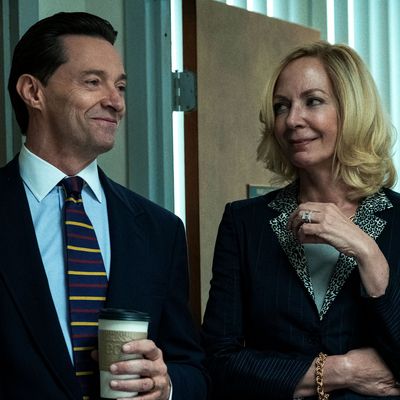
Hugh JackmanÔÇÖs a showman at heart, an actor whoÔÇÖs always been better at projecting toward the back of the house than scaling down into naturalism. He can commit wholeheartedly and with admirable gusto to a Wolverine growl, and he can belt the hell out of some Rodgers and Hammerstein. But the same innate theatrical streak can come across as artificiality in less heightened roles ÔÇö which is why heÔÇÖs tended to be at his best in movies that lean into the quality. And Bad Education, the new film from Thoroughbreds director Cory Finley, is the kind of work that plays into JackmanÔÇÖs strengths with a savvy precision. As Frank Tassone, school superintendent for the village of Roslyn on Long IslandÔÇÖs tonier North Shore, Jackman gives his best dramatic performance since he played the obsessive, hollow Robert Angier in The Prestige.
Frank is a man who spends his days patiently handling helicopter parents and jaunting off to attend education conferences over the weekend. The most significant relationship in his life appears to be with his job, which heÔÇÖs both devoted to and tireless at, though on his desk he keeps a photo of the late wife he says he is still grieving for. He may be an administrator, but heÔÇÖs a performer at heart, and what he loves most is being onstage, never seeming more alive than when heÔÇÖs being adored. The first time we see him, heÔÇÖs using the menÔÇÖs restroom as his own personal green room, doing some last-minute primping in front of the mirror before going out in front of an applauding crowd in the auditorium. TheyÔÇÖre congratulating him for the fact that under his stewardship, Roslyn has risen to a new high point on the Wall Street JournalÔÇÖs annual list of public schools ÔÇö though it rankles Frank that theyÔÇÖre only number four, and not number one.
Bad Education is based on the true story of a major embezzlement case that rocked the Roslyn school district, and that was actually reported by New York in 2004, in a feature that informed the script from writer (and Roslyn grad!) Mike Makowsky. But if youÔÇÖre not already caught up on your turn-of-the-millennium Long Island scandals, IÔÇÖd suggest steering clear of the details and letting the film unfold them for you. The narrative is pushed along with the help of Rachel (Geraldine Viswanathan), a reporter at the school newspaper who comes to Frank for some quotes on a self-described ÔÇ£puff pieceÔÇØ about an upcoming construction project. He challenges her to think bigger than that, a gesture of encouragement thatÔÇÖs practically conditioned, but that turns out to be an act of hubristic folly. She takes his words to heart and starts digging, her story running in parallel to his, and by the next time they have a talk, sheÔÇÖs started to unravel damning truths about the way the schoolÔÇÖs money has been spent, a foe of FrankÔÇÖs own inadvertent creation.
ItÔÇÖs a delicious touch, the teen journalist playing a role in exposing the truth, but then, a lot of the details of this story are worth savoring. One of the reasons the film is such a satisfying watch, if a little less straightforwardly entertaining than Thoroughbreds, is how it sidles up to new developments slowly, using each one to shed light on a previously unseen and often surprising aspect of FrankÔÇÖs life and personality. HeÔÇÖs a man whoÔÇÖs been driven off the rails by the contradictions of his job, of running a school thatÔÇÖs meant to be a public good but thatÔÇÖs still obviously awash in commerce. He and all the people he works with are supposed to have chosen their careers for the meaning, not the money. But at the same time, as the movie underscores early on, a good school brings up housing prices and attracts more funding from parents ÔÇö the people who then expect to be treated like customers. Frank runs his district as though it were a corporation, with SAT scores and college acceptance in place of profits. But then, if heÔÇÖs the CEO in addition to being a humble civil servant, well, doesnÔÇÖt he deserve some of the things that CEOs get?
Jackman has some able support in the film from Ray Romano as a trustee and supporter, and Rafael Casal as a former student. But Allison Janney, who plays FrankÔÇÖs fellow administrator and functional accomplice, Pam Gluckin, is his most revealing screen partner. PamÔÇÖs slip-up sets events into motion, bringing attention to how openly school money is being spent on things that are not remotely school related. But before any of that happens, thereÔÇÖs a scene in which she and Frank grab a few minutes to eat lunch together outside; she eats a sandwich, and he sips on a diet smoothie. They have the teasing dynamic of two people who know each other very well, but what stands out about the scene, in retrospect, is how little they say out loud. The scene gives you a taste of how they ended up where they did, maybe never actively conspiring, just allowing things to happen, a little more each time. The perversity of it all is that Frank is both great at his job and a self-deluding criminal, and Jackman finds drollness in this juxtaposition alongside a sense of tawdry tragedy.
More Movie Reviews
- Julianne Moore and Tilda Swinton Are Perfectly Imperfect Together
- Tyler PerryÔÇÖs Cosplay of a War Movie Hardly Does Its Subjects Justice
- Jim Carrey (and Jim Carrey) Elevate Sonic the Hedgehog 3


